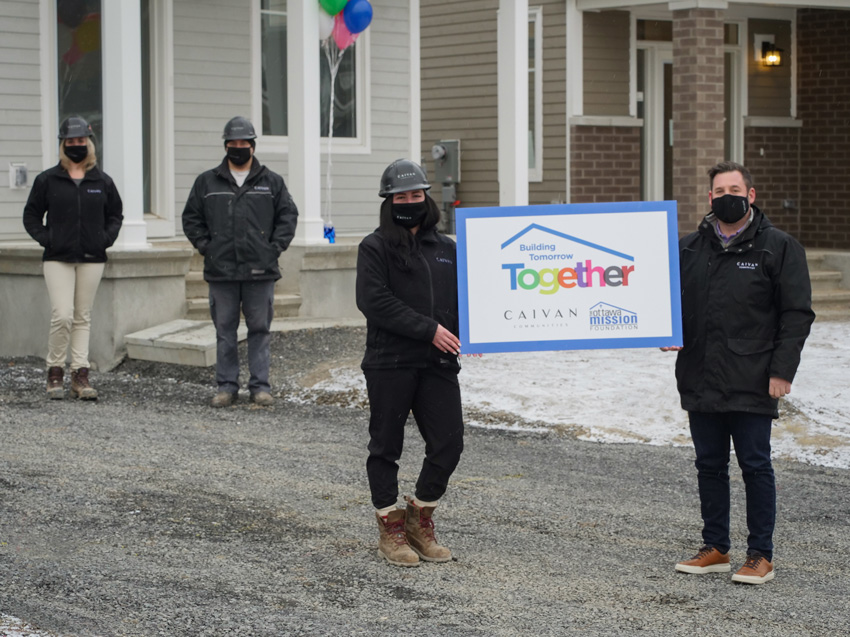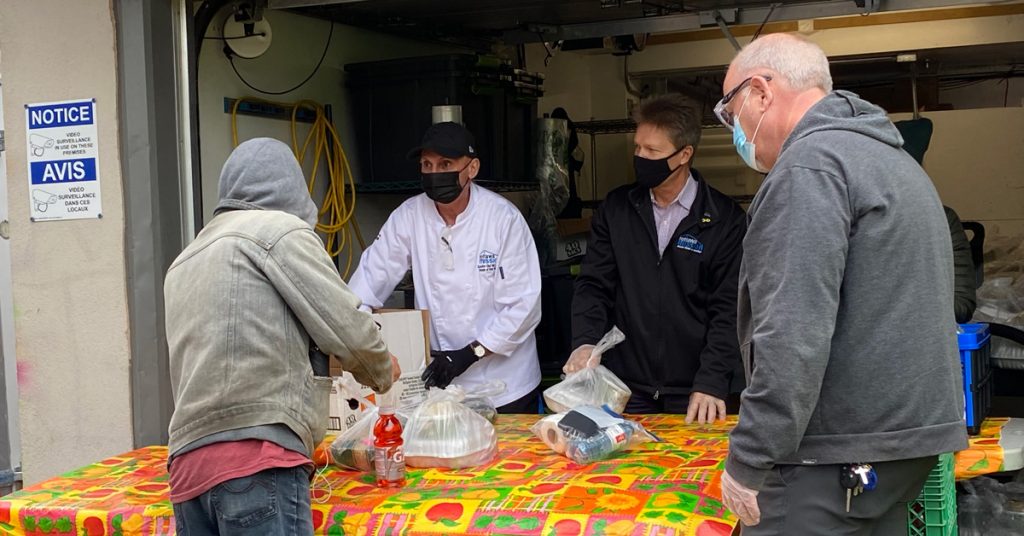Public opinion poll and shelter user data illustrate fine line between who is homeless and who is not
Ottawa, ON – As Ottawa enters the second wave of the continuing Covid19 pandemic, The Ottawa Mission has released a public opinion poll by Nanos Research which shows the impact of the pandemic on residents’ finances, mental health and perceived risk of homelessness.
“Last year, homelessness was at a level our community had never seen, which is why Ottawa City Council unanimously declared a homelessness emergency in January this year. Now, seven months into Covid19, this poll shows the burden that the pandemic has imposed on our citizens, including financial pressures, compromised wellbeing, and concerns about the increased risk of homelessness. With winter approaching and the lifting of prohibitions on evictions due to Covid19, we need a plan now to ensure that homelessness in our city doesn’t get even worse,” stated Special Liaison for Housing and Homelessness Councillor Catherine McKenney, who moderated today’s press conference.
President of Nanos Research Nik Nanos outlined the stark findings of the poll. “Over one-third of respondents indicated that Covid19 has had a negative (18%) or somewhat negative impact (18%) on their personal finances, most frequently saying it’s due to lost income or employment. Just under one in five said that the pandemic has increased (6%) or somewhat increased (11%) the risk of homelessness for those they care about. Just under one in ten said that the pandemic has increased or somewhat increased their personal risk of homelessness.”
In November 2019, Nanos Research reported that almost 50% of Ottawa residents indicated someone they cared about faced a risk of being homeless, and homelessness was the number one issue of concern to them at the municipal level. In August 2020, in a national poll for the Canadian Alliance to End Homelessness, Nanos Research reported that a strong majority (72%) thought it is urgent to work to end homelessness in Canada, with just over one in seven Canadians worried (5%) or somewhat worried (11%) about paying their housing costs.
According to the new Nanos poll for The Ottawa Mission, over one in ten people in Ottawa are receiving the Canadian Emergency Response Benefit (CERB) (6%) or someone in their household is (6%). A majority of these people are concerned (42%) or somewhat concerned (31%) about the CERB ending. Furthermore, one in two respondents are concerned (20%) or somewhat concerned (30%) about the possible negative impact of a second wave of Covid19 on their finances. Almost two-thirds of respondents would support (51%) or somewhat support (17%) a basic universal income program.
Also according to this new poll, the impact of the pandemic on respondents’ mental health has been significant, with a majority reporting a negative (17%) or somewhat negative impact (47%) due to quarantine and isolation, and mental health conditions such as anxiety, stress and depression.
“Clearly, the pandemic has had a significant impact on the people of Ottawa. This poses very serious questions about how to address these impacts as we enter the second wave of Covid19,” Nanos added.
Along with the new Nanos poll, The Ottawa Mission released a research report which analyzed the health conditions and living circumstances of 283 shelter guests who stayed at the shelter from 2015-2019. Forty-eight percent were deemed moderate acuity (or level of need) and 48% high acuity. Stephanie Rattelade, PhD, Data and Evaluation Manager for The Mission, presented the analysis, which showed that among these shelter guests:
- 76% reported a mental health challenge or cognitive impairment that impacted their daily functioning;
- 71% reported at least one chronic or serious health condition;
- 49% reported actively abusing substances or alcohol;
- 40% reported concurrent mental health and substance use challenges; and
- 51% reported an experience of trauma or abuse that directly impacted their homelessness.
Shelter guests also reported other aspects of their lives which were challenging, such as involvement in high-risk situations, difficulties with money management, and lack of meaningful activities in their lives.
“The levels of complex health needs of respondents were high compared to other studies of homeless populations. These results highlight the day-to-day challenges that some of the homeless men in our city experience,” noted Rattelade.
Prior to the establishment of the Jim Durrell Centre as an overflow shelter for homeless men, The Ottawa Mission had been at over 100% capacity for emergency shelter beds for the past three years, laying down mats on its chapel floor to accommodate those who needed shelter. The Centre ameliorated this situation and enabled the Mission to enhance social distancing measures within its shelter to minimize the risk of Covid19. However, the need for emergency shelter beds is steadily increasing at the shelter, which is spawning real concern in advance of colder temperatures since occupancy at The Mission usually increases by 10% or more during the winter months.
“There’s a fine line between who is homeless and who is not. Many of our shelter guests bear a very heavy burden of compromised health conditions, particularly mental health issues, and difficult life circumstances such as financial problems. Because of Covid19, we’re now seeing higher levels of mental health issues and financial stress in the community as a whole. As we enter the second wave of Covid19, I have real fears that these issues will get worse, with more people unable to maintain their housing or their mental health,” noted Ottawa Mission CEO Peter Tilley.
“In 2019, it was confirmed that people in our community thought that homelessness should be the number one priority of Ottawa City Council. In 2020, we learned that two out of three people in Ottawa support a Universal Basic Income program, which would be a federal responsibility, to deal with financial impacts of Covid19.Given the magnitude of homelessness in Ottawa and the impact of Covid19, all levels of government must work together to address this problem now and ensure that even more of our citizens don’t fall into homelessness,” Tilley concluded.
An Analysis of Health Conditions and Support Needs of Shelter Guests at The Ottawa Mission, October 27, 2020 (PDF)
Oct. 27 Nanos Presentation (PDF)
About The Ottawa Mission
Since 1906, The Ottawa Mission has been serving the homeless, the hungry and the lost by providing food, clothing, shelter and hope. In 2019-2020, The Ottawa Mission provided emergency shelter to an average of 197 men every night and served an average of 1,422 meals every day. The Ottawa Mission also provides health services, mental health and addiction treatment programs, hospice care, dental services, housing services, educational support, job training, spiritual care, and men’s clothing to thousands in need in our community. In September 2020, The Ottawa Mission marked the one millionth hour that the shelter has been in existence since its founding in 1906. In 2019, the Mission became a housing-focused shelter reflective of its commitment to a home for everyone as a human right with the launch of a new housing department.
About Nanos Research Methodology
Nanos conducted an RDD dual frame (land- and cell-lines) random telephone survey of 801 City of Ottawa residents, 18 years of age or older, between September 10 – 20. Participants were randomly recruited by telephone using live agents and administered a survey. The margin of error for this survey is ±3.5 percentage points, 19 times out of 20. The research was commissioned by Ottawa Mission and was conducted by Nanos Research.
FOR INFORMATION, PLEASE CONTACT:
Aileen Leo
Director of Communications
T 613.234.1144 x 305
C. 613-712-3092
E-mail: aleo@ottawamission.com





